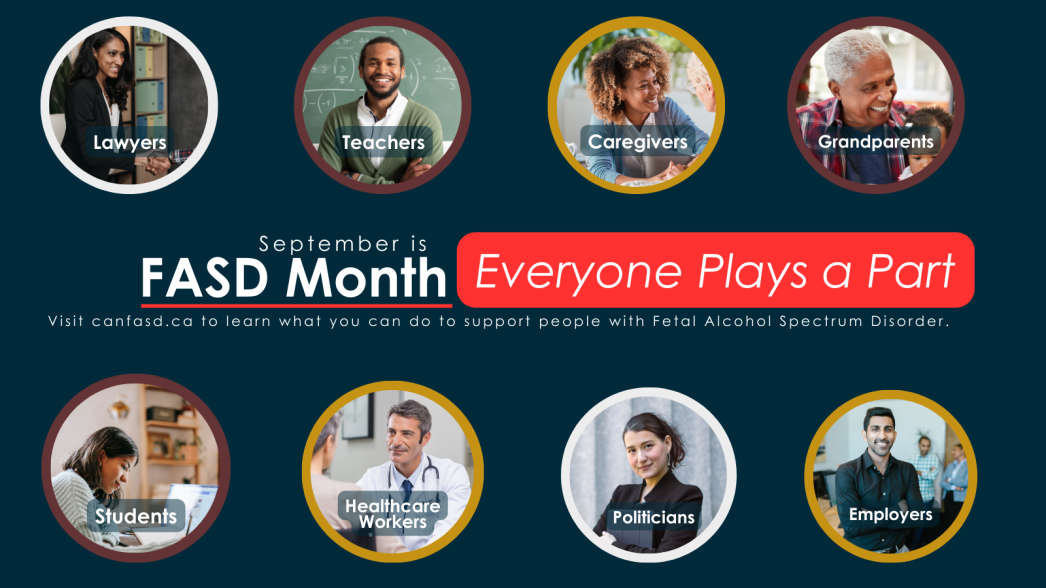Welcome back to our blog series for FASD Awareness Month 2024! In this special edition, we are thrilled to feature individuals from various professions. They share their perspectives on how they play a vital role in supporting people with Fetal Alcohol Spectrum Disorder (FASD).
We’ll delve into the ways in which different kinds of professions play their part in helping people with FASD.
Teachers play a part
Lisa Rogozinsky, MA is the WRaP 2.0 Project Lead and Network Coordinator at the Edmonton and Area Fetal Alcohol Network. She tells us how teachers play a part in supporting people with FASD.
“Every day, I witness the vital role everyone plays in supporting individuals with Fetal Alcohol Spectrum Disorder (FASD). In the classroom, it’s about more than just teaching; it’s about understanding each student’s unique needs and adjusting the classroom environment and teaching strategies to meet those needs. Teachers work diligently to adapt their methods, ensuring they are inclusive and accommodating. By collaborating closely with families, healthcare providers, and community organizations, educators help to create strong support networks. This collaborative approach is essential in providing personalized support that enables each student to succeed.
It’s a community effort where each of us—whether a teacher, parent, frontline staff, or neighbour—can make a difference. By working together, we can ensure that every student with FASD has the opportunity to reach their full potential in an inclusive school space. By working together, we are fostering resilience and supporting students with FASD to navigate their educational journeys successfully.”
Psychologists play a part
Brenda M Knight MA is a Psychologist in Vancouver, British Columbia. She tells us how psychologists play a part in supporting people with FASD.
“Contributing to the mental health care of individuals and families living with FASD is a rewarding and stimulating career for a psychologist. It is an opportunity to creatively expand and modify your current therapeutic skills and knowledge often with a team of dedicated professionals who generously support your professional growth.
Each person with FASD is unique, with their own interests, personality and life experiences. If you have therapeutic interests related to foster care, adoption, trauma, neurodiversity, sports psychology, grief, loss, parenting, relationship support, adjustment to disabilities, cultural differences, health care, expression of creativity, aging and just coping with everyday life experiences, FASD could be an inspiring addition to your practice. Individuals with FASD sometimes choose to work as mental health professionals as well.
In the forty years since I integrated this work into my private practice, I have deeply enjoyed supporting birth, kin, foster and adoptive parents. We learn from them, their children, and their children’s children. Today with access to virtual care more people can benefit from psychology services. Isolation is reduced. Psychologists can access on-line continuing education and in-person clinical and research conferences. I would be pleased to discuss offering mentorship to psychologists who are new to FASD mental health care. I suspect that other psychologists would too.”
Marketing and media professionals play a part
Fiona Binns is the Communications Coordinator at the Canada FASD Research Network. She tells us how marketing professionals play a part in in shaping the way the public thinks about FASD.
“Media and marketing professionals play a crucial role in shaping public perception and understanding of FASD. It is essential that the marketing materials we create and share are informed by accurate, evidence-based information to ensure that they reflect the complexities of FASD. Additionally, communications about FASD should represent the diverse experiences of individuals with FASD and their families, avoiding stereotypes and generalizations.
It is imperative that these communications are non-stigmatizing, emphasizing compassion and support rather than blame and stigma. By prioritizing informed, inclusive, and respectful messaging, media and marketing professionals can contribute to a more empathetic understanding of FASD, ultimately contributing to a society that is supportive of healthy pregnancies and supportive of people with FASD.”
Politicians and policy makers play a part
Finally, politicians and policy makers are instrumental in helping people with FASD at an institutional level. They can also create alcohol policies that support FASD prevention. They have the power to improve the lives of people with FASD and their families by supporting a National FASD Framework .
Earlier this month, Senators Mohamed Ravalia and Patrick Brazeau made a joint statement regarding the urgent need for increased awareness of FASD and the necessity for stronger alcohol-related public health policies in our country.
Senator Mohamed Ravalia said: “As a rural family physician for over thirty-five years, I have seen the need for a coordinated, interdisciplinary approach to addressing the disparities in FASD prevention, diagnosis, and support across Canada. Bill S-253 is an important step towards providing access to equitable, culturally appropriate, and comprehensive care”.
Senator Patrick Brazeau said: “I wholeheartedly support Bill S-253 and the need for a national strategy to address the staggering implications of FASD. Bill S-253 and Bill S-254, An Act to Amend the Food and Drugs Act to include alcohol warning labels that I introduced in 2022, work together to ensure Canadians have full knowledge of the negative and life-changing impacts of alcohol consumption. The time is now to act towards prevention, education and support of a fetal alcohol spectrum disorder national framework”.
We urge other politicians and policy makers to follow Senators Mohamed Ravalia and Patrick Brazeau’s lead by supporting the National FASD Framework.
Everyone plays a part!
In conclusion, these four jobs are just a sample of the numerous professions that have a part to play. Check out our interactive webpage to find a list of other professions that can work together to shape a fairer society. Every profession has steps they can take to support healthy pregnancies and support people with FASD.

